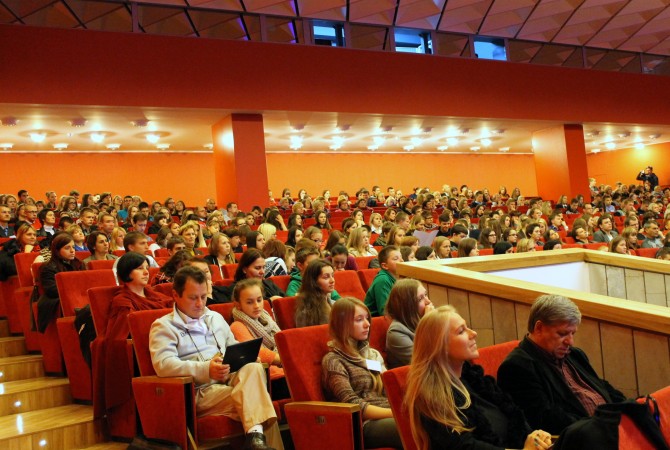General Programmes of 1997 were raising difficult goals for the Lithuanian secondary schools – “to bring up young people that want and can live according to democratic standards: that are not adapting themselves to the post-communist society’s reality, but are able to change this reality”, “to lay the ground for a citizens’ community, that is able to create its own historical fate”. Nowadays it is clear that these goals cannot be successfully reached without implementation of civic activity practices in schools and without supplementing formal education with non-formal civic education.
Civic education in Lithuanian secondary schools is still too theoretical. That is why students often lack practical knowledge that is needed for a mature civic life and abilities to adapt their knowledge to active civic practice and problem-solving. The goal of the project was to complement studies in secondary schools and colleges with concrete civic practices.
120 educational institutions (secondary schools, gymnasiums and colleges) in 30 Lithuanian municipalities were chosen to implement the project. With the help of experts of different kind these participants were taught to prepare and carry out civic activity projects that would be significant to all the society. The most successful projects were developed to the national projects and implemented all over the country. Teachers, professors and students got new competences to participate in the public life, their civic empowerment and relationship with the country was strengthened. Moreover, the project helped strengthening co-operations among local communities, schools, non-governmental organizations, gymnasiums and colleges.
The aim of this project is to stimulate the civic potential that lies in the local communities and to address it to the creation of the democratic republic. During the project, schools and local communities were taught to act like small republics – as independent communities made up of independent and responsible individuals that together managed common issues.
120 teams participating in this project identified the most delicate problems and was trying to solve them with the help of experts of different areas. Specific projects were addressed to such issues as emigration, corruption, poverty, government accountability and transparency, environment and heritage protection, national and civic education etc. These issues were being managed on the school, municipality and national level.
Project activities:
• Based on the regional representativeness principal, the project participants are chosen: approximately 4 educational institutions in 30 Lithuanian regions.
• A survey about civic education in schools and civic power of youth and teachers is carried out: researches already done in this area are analyzed and representative survey is carried out in the local communities and schools.
• Training programs and techniques are prepared by the experts co-operating with project partners and participants.
• Trainings are carried out in 30 Lithuanian regions: with the help of experts, 120 teams identify the issues that are significant to them and try to manage them. This is done during creative workshops where students, teachers, members of NGO’s, local community leaders and experts work together.
• Successful local projects will be turned into national initiatives and implemented all over Lithuania. With the help of media and social advertisement, these initiatives will be presented to the whole society.
• In the end of the project, another survey is carried out to evaluate the change of civic power in the local communities and schools.
• A methodological material for the civic education in schools is prepared by the experts: new ways of teaching civic education are proposed and recommendations for the public policy are presented to the public.
The initiator of the project is the Civil Society Institute. The project is carried out together with over 20 partners. It is financed by the European Union Social Fund and Lithuanian Republic budget.
